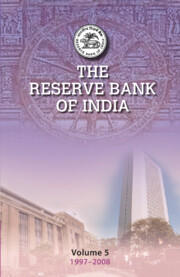Book contents
- Frontmatter
- Contents
- Tables
- Boxes
- Foreword
- Preface
- Acknowledgements
- List of Abbreviations
- 1 Introduction: Managing Liberalisation
- 2 The Macroeconomic Context
- 3 Monetary Management
- 4 Foreign Exchange Market and Management of the Capital Account
- 5 Foreign Exchange Reserves Management
- 6 Financial Markets
- 7 Public Debt Management
- 8 The Payment and Settlement Systems
- 9 Currency Management
- 10 Regulation of the Financial System – Part I: Commercial Banks
- 10 Regulation of the Financial System Part II: Other Financial Institutions
- 11 Supervision of the Financial System
- 12 Rural Credit
- 13 Financial Inclusion
- 14 Communication Policy
- 15 Organisational Change
- Appendices
- Photographs
- Select Bibliography
- Index
15 - Organisational Change
Published online by Cambridge University Press: 10 January 2023
- Frontmatter
- Contents
- Tables
- Boxes
- Foreword
- Preface
- Acknowledgements
- List of Abbreviations
- 1 Introduction: Managing Liberalisation
- 2 The Macroeconomic Context
- 3 Monetary Management
- 4 Foreign Exchange Market and Management of the Capital Account
- 5 Foreign Exchange Reserves Management
- 6 Financial Markets
- 7 Public Debt Management
- 8 The Payment and Settlement Systems
- 9 Currency Management
- 10 Regulation of the Financial System – Part I: Commercial Banks
- 10 Regulation of the Financial System Part II: Other Financial Institutions
- 11 Supervision of the Financial System
- 12 Rural Credit
- 13 Financial Inclusion
- 14 Communication Policy
- 15 Organisational Change
- Appendices
- Photographs
- Select Bibliography
- Index
Summary
Introduction
During the period under reference, globalisation, rapid economic growth, advances in information technology (IT), new responsibilities and increasing public scrutiny of its policies and functions posed enormous challenges to the Reserve Bank’s organisational set-up. At the same time, there was a fall in staff size. The Bank addressed new challenges by trying to upgrade the skills, technical expertise and professionalism of its employees, by means of in-house and external training, and strategic changes in placement and recruitment policy. Employee welfare measures received special attention, and efforts were undertaken to make the Bank’s compensation package competitive and attract talented individuals to its service. Mechanisation and computerisation, especially in the operational departments, were accorded top priority. A few new regional offices were opened after the formation of new states. And new departments were carved out to address emerging challenges. The system of internal inspection and audit was changed to adopt a risk-based approach of surveillance. Alongside, accounting norms were strengthened, and annual accounts of the Bank became more transparent in terms of dissemination of information relating to the composition of the balance sheet, valuation practices, changes in accounting practices, and different sources of income and expenditure.
The present chapter outlines these changes. The chapter is divided into ten main topics: the boards and committees, central and regional offices, new departments, human resource and staff matters, IT, rationalisation of systems and procedures, audit, inspection, balance sheet and ownership of institutions.
Boards and Committees
The Central Board of Directors carries out the general superintendence and provides direction to the affairs of the Bank. The Board is appointed by the Government of India in keeping with the provisions of Reserve Bank of India (RBI) Act. There are official and non-official Directors. While the former comprises the Governor and the Deputy Governors, the latter consists of Directors nominated by the government. Of these, ten are drawn from various fields, one is a government official and four are nominated from the local boards. There are four local boards – Western, Eastern, Northern and Southern. These boards are set up to advise the Central Board on local matters, to represent territorial and economic interests of local cooperatives and banks, and to perform such other functions as delegated by the Central Board from time to time.
- Type
- Chapter
- Information
- The Reserve Bank of IndiaVolume 5, 1997–2008, pp. 614 - 659Publisher: Cambridge University PressPrint publication year: 2023



